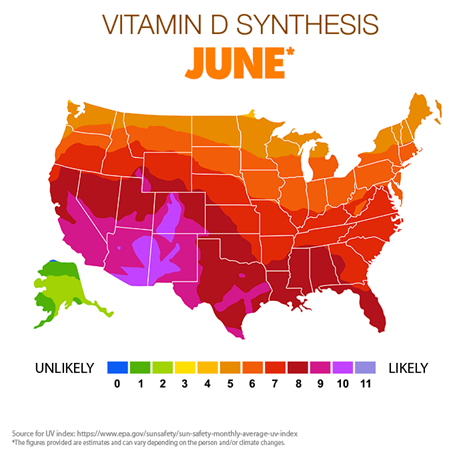Ah, the gifts of summertime-summer sun, vitamin sea, and yes, vitamin D. For some, it means lots of sunscreen and even a few sunburns. For many, it means a lot of confusion about what is best for our health – the exposure to sun or the vitamin D. In this article (part 1), I’ll focus on the importance of vitamin D, what adequate levels should be, and how lifestyle and genetics impact vitamin D levels.

The Importance of Vitamin D
Once thought of as only playing a role in certain diseases, researchers now realize that vitamin D affects virtually every cell and tissue in our bodies. Additionally, it affects numerous vitamin D receptors located throughout our bodies, not to mention nearly 3,000 genes.
For years, the focus of education on the importance of vitamin D was limited to bone and joint health. However, as I’ve continued to study, I’ve been so impressed with the impact of vitamin D on immune health and cancer prevention. Most of the women I work with, some of whom have been diagnosed with breast cancer, have had low vitamin D levels. In the recent past, we’ve learned that low vitamin D was also a huge risk factor for COVID-19.
As the research continues on vitamin D, the list of health benefits continues to grow! Here’s an example of the growing list –
- Athletic performance
- Bone strength and health
- Blood pressure health
- Blood sugar health
- Carbohydrate and Fat metabolism
- Cellular growth and development
- Digestion and absorption of nutrients
- Hair and hair follicles
- Healthy aging processes
- Hearing and vision
- Heart Health
- Immune function
- Joint Health
- Metabolic rate
- Mood and overall feelings of well-being
- Neurological and cognitive health
- Newborn health
- Muscular function
- Pancreatic function and health
- Sleep patterns
- Reproductive health
- Respiratory function and health
- Skin health
- Vascular System health
- Weight management
Now, all those benefits inspire me to keep my vitamin D levels optimized!
How high should your Vitamin D level be?
Nearly all vitamin D researchers agree that the recommended range for healthy “average” vitamin D3 levels is 40 to 60 ng/ml, not 20 ng/ml, as previously stated. Dr. Joseph Mercola (vitamin D expert) and Functional Medicine institutions teach that Vitamin D should be at least 50-70ng/dl. Additionally, during the COVID pandemic, they recommend closer to 100ng/ml for optimal immune health. Personally, I have kept mine at 100 with D-sorb during the last few years but now see it rising. The Vitamin Sea and Sunshine I’m getting here in Tampa is making a difference so I can lower my supplementation dose. Have you had your vitamin D level checked lately? If not, it’s very inexpensive with most insurance plans. If your doctor is not on top of this, ask them to test your Vitamin D. You deserve to know so you can experience the health benefits listed above.
Is your lifestyle supporting your Vitamin D?
Vitamin D levels tend to be very low across North America, obviously, especially during the winter months. To get the vitamin D your body needs for all its cells and tissues, four conditions must be met:
- You expose large portions of your body, not just your hands and face.
- You’re outside when UVB rays are at their peak, the only type of wavelengths that produce vitamin D.
- You avoid the use of sunscreen during UVB exposure as it can prevent your skin from producing vitamin D. NOTE- see below for more info on Sunscreens and DNA damage)
- You’re in a latitude that has adequate UVB rays.
Many people believe taking a walk during a midday break fulfills their vitamin D needs, but you now know that is usually not true. And of these four conditions, the last one may be the biggest deal-breaker of all…
As you can see from the chart below, in most parts of the U.S. (and the Northern hemisphere, including Canada), you can’t get enough sunlight to produce adequate levels of vitamin D in your skin.

Dr. Michael Holick, a recognized vitamin D expert, has determined that if you live north of Atlanta, Georgia in the U.S., you cannot make vitamin D in your skin from about November through February.
Even as far south as Miami, Florida, you only make about 10 to 20 percent of the vitamin D in winter that you make during the summer months, thus vitamin D supplementation is important.
How do Genetics impact your Vitamin D?
As I shared above, vitamin D can impact over 3000 genes! I’m all about optimizing the function of our genes – as the science known as Epigenetics- thus the reason I have preached that we must optimize our vitamin D levels.
If vitamin D impacts our genes, how do our genes, in turn impact our vitamin D levels? There are several genetic variations or SNPs (Single Nucleotide Polymorphisms) that impact vitamin D. Some of these SNPs affect the absorption of vitamin D from the sun to the skin, others affect transport to various organs, and still others impact the absorption of vitamin D supplements. Again, if you are older, have darker skin, are obese or live in higher latitude locales, these issues can be of much greater importance!
I had very low vitamin D levels for years. Then I did my DNA test and found out why. I have SNPs in the absorption from supplements. Once I started taking D-Sorb (see below) my vitamin D levels climbed to a healthy range. Now, D-sorb provides a much higher dose than many individuals may need. But for those with very low vitamin D levels that won’t budge with other supplements or from a genetic SNP, D-sorb may be the best option.
I have created a simple Vitamin D protocol on my FullScript.com Account for you to see 3 different vitamin D formulations
· D-Sorb
· D3-K2
· Liquid Vitamin D
For the month of July, I am giving a special 15% discount on my site. You can look at any other products on the site to meet you / your family’s nutritional needs.
NOTE: these are only options for you to choose from. You MUST work with your own healthcare professional to follow up with lab testing, optimally before and after, you begin Vitamin D therapy to adjust your dosing. This information and recommendations are NOT to replace a consult with your own medical provider.
Next week I’ll discuss Sun Protection, Sunscreens and how to optimize your Vitality in the sun.
Sources –https://www.medicalnewstoday.com/articles/normal-vitamin-d-levels#deficiency

